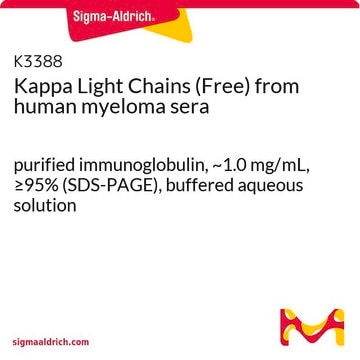K3502
Anti-Human Kappa Light Chain (Bound and Free) antibody produced in goat
affinity isolated antibody, lyophilized powder
About This Item
Javasolt termékek
biológiai forrás
goat
Minőségi szint
konjugátum
unconjugated
antitest forma
affinity isolated antibody
antitest terméktípus
secondary antibodies
klón
polyclonal
form
lyophilized powder
technika/technikák
quantitative precipitin assay: suitable
tárolási hőmérséklet
2-8°C
célzott transzláció utáni módosítás
unmodified
Géninformáció
human ... IGK@(50802)
Looking for similar products? Látogasson el ide Útmutató a termékösszehasonlításhoz
Általános leírás
Immunogen
Alkalmazás
Fizikai forma
Feloldás
Jogi nyilatkozat
Nem találja a megfelelő terméket?
Próbálja ki a Termékválasztó eszköz. eszközt
Analitikai tanúsítványok (COA)
Analitikai tanúsítványok (COA) keresése a termék sarzs-/tételszámának megadásával. A sarzs- és tételszámok a termék címkéjén találhatók, a „Lot” vagy „Batch” szavak után.
Már rendelkezik ezzel a termékkel?
Az Ön által nemrégiben megvásárolt termékekre vonatkozó dokumentumokat a Dokumentumtárban találja.
Az ügyfelek ezeket is megtekintették
Tudóscsoportunk valamennyi kutatási területen rendelkezik tapasztalattal, beleértve az élettudományt, az anyagtudományt, a kémiai szintézist, a kromatográfiát, az analitikát és még sok más területet.
Lépjen kapcsolatba a szaktanácsadással












